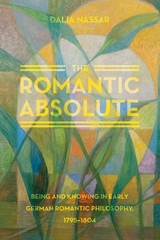
Scholars today interpret philosophical romanticism along two competing lines: one emphasizes the romantics’ concern with epistemology, the other their concern with metaphysics. Through careful textual analysis and systematic reconstruction of the work of three major romantics—Novalis, Friedrich Schlegel, and Friedrich Schelling—Nassar shows that neither interpretation is fully satisfying. Rather, she argues, one needs to approach the absolute from both perspectives. Rescuing these philosophers from frequent misunderstanding, and even dismissal, she articulates not only a new angle on the philosophical foundations of romanticism but on the meaning and significance of the notion of the absolute itself.
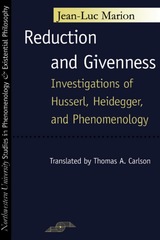
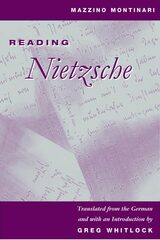
In Reading Nietzsche Montinari tackles such subjects as the relationship between Nietzsche and Wagner, early drafts of Thus Spoke Zarathustra, and the philosopher’s reputation among the Nazis and Marxists of the 1930s and 1940s. He also deals authoritatively with a number of figures who have had an unfortunate influence upon the way Nietzsche has been understood, from the chief Nazi interpreter of Nietzsche, Alfred Bäumler, to the chief Marxist interpreter, Georg Lukàcs, to Nietzsche’s sister, Elisabeth.

This volume, published on the fiftieth anniversary of Wittgenstein's death, brings together thirteen of Crispin Wright's most influential essays on Wittgenstein's later philosophies of language and mind, many hard to obtain, including the first publication of his Whitehead Lectures given at Harvard in 1996.
Organized into four groups, the essays focus on issues about following a rule and the objectivity of meaning; on Saul Kripke's contribution to the interpretation of Wittgenstein; on privacy and self-knowledge; and on aspects of Wittgenstein's philosophy of mathematics. Wright uses the cutting edge of Wittgenstein's thought to expose and undermine the common assumptions in platonistic views of mathematical and logical objectivity and Cartesian ideas about self-knowledge. The great question remains: How to react to the demise of these assumptions? In response, the essays develop a concerted, evolving approach to the possibilities--and limitations--of constructive philosophies of mathematics and mind. Their collection constitutes a major statement by one of Britain's most important philosophers--and will provide an indispensable tool both for students of Wittgenstein and for scholars working more generally in the metaphysics of mind and language.
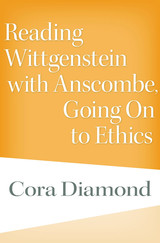
In Reading Wittgenstein with Anscombe, Going On to Ethics, Cora Diamond follows two major European philosophers as they think about thinking, as well as about our ability to respond to thinking that has miscarried or gone astray. Acting as both witness to and participant in the encounter, Diamond provides fresh perspective on the importance of the work of these philosophers and the value of doing philosophy in unexpected ways.
Diamond begins with the Tractatus (1921), in which Ludwig Wittgenstein forges a link between thinking about thought and the capacity to respond to misunderstandings and confusions. She then considers G. E. M. Anscombe’s An Introduction to Wittgenstein’s Tractatus (1959), in which Anscombe, through her engagement with Wittgenstein, further explores the limits of thinking and the ability to respond to thought that has gone wrong. Anscombe’s book is important, Diamond argues, in challenging contemporary assumptions about what philosophical problems are worth considering and about how they can be approached. Through her reading of the Tractatus, Anscombe exemplified an ethics of thinking through and against the grain of common preconceptions. The result drew attention to the questions that mattered most to Wittgenstein and conveyed with great power the nature of his achievement.
Diamond herself, in turn, challenges Anscombe on certain points, thereby further carrying out just the kind of ethical work Wittgenstein and Anscombe each felt was crucial to getting things right. Through her textured engagement with her predecessors, Diamond demonstrates what genuinely independent thought is able to achieve.
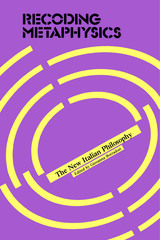
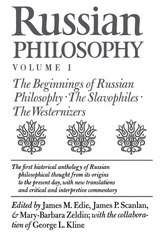
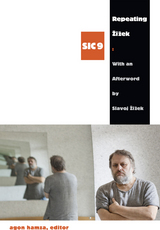
Contributors. Henrik Jøker Bjerre, Bruno Bosteels, Agon Hamza, Brian Benjamin Hansen, Adrian Johnston, Katja Kolšek, Adam Kotsko, Catherine Malabou, Benjamin Noys, Geoff Pfeifer, Frank Ruda, Oxana Timofeeva, Samo Tomšic, Gabriel Tupinambá, Fabio Vighi, Gavin Walker, Sead Zimeri, Slavoj Žižek

Remembering Paradise studies three major eighteenth-century nativist scholars in Japan: Kada no Azumamaro, Kamo no Mabuchi, and the celebrated Motoori Norinaga. Peter Nosco demonstrates that these scholars, frequently depicted as the formulators of rabid xenophobia, were intellectuals engaged in a quest for meaning, wholeness, and solace in what they perceived to be disordered times. He traces the emergence and development of their philosophies, identifying elements of continuity into the eighteenth century from the singular Confucian-nativist discourse of the seventeenth century. He also describes the rupture between nativism and Confucianism at the start of the eighteenth century and the quest for ancient, distinctly Japanese values.
The emphasis on patriotism and nostalgia in the works of these three scholars may have relevance to the kind of nationalism emerging in Japan in the 1980s, manifested in a renewed interest in visiting one's home place and in the history and culture of the seventeenth through mid-nineteenth centuries. The current fusion of nationalism and nostalgia can perhaps be better understood through Nosco's analysis of comparable sentiments that were important in earlier times.
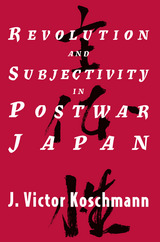
In a major contribution to modern Japanese intellectual history, J. Victor Koschmann analyzes the debate over subjectivity. He traces the arguments of intellectuals from various disciplines and political viewpoints, and finds that despite their stress on individual autonomy, they all came to define subjectivity in terms of deterministic historical structures, thus ultimately deferring the possibility of radical change in Japan.
Establishing a basis for historical dialogue about democratic revolution, this book will interest anyone concerned with issues of nationalism, postcolonialism, and the formation of identities.
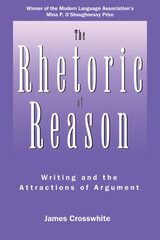
To those who have lost faith in the abilities of people to reach reasoned mutual agreements, and to others who have attacked the right-or-wrong model of formal logic, this book offers the reminder that the rhetorical tradition has always viewed argumentation as a dialogue, a response to changing situations, an exchange of persuading, listening, and understanding. Crosswhite’s aim is to give new purpose to writing instruction and to students’ writing, to reinvest both with the deep ethical interests of the rhetorical tradition. In laying out the elements of argumentation, for example, he shows that claiming, questioning, and giving reasons are not simple elements of formal logic, but communicative acts with complicated ethical features. Students must learn not only how to construct an argument, but the purposes, responsibilities, and consequences of engaging in one.
Crosswhite supports his aims through a rhetorical reconstruction of reason, offering new interpretations of Plato and Aristotle and of the concepts of reflection and dialogue from early modernity through Hegel to Gadamer. And, in his conclusion, he ties these theoretical and historical underpinnings to current problems of higher education, the definition of the liberal arts, and, especially, the teaching of written communication.
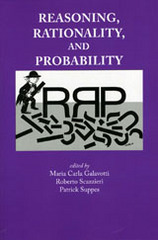
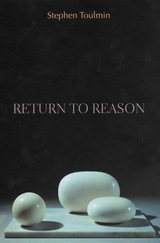
The turmoil and brutality of the twentieth century have made it increasingly difficult to maintain faith in the ability of reason to fashion a stable and peaceful world. After the ravages of global conflict and a Cold War that divided the world's loyalties, how are we to master our doubts and face the twenty-first century with hope?
In Return to Reason, Stephen Toulmin argues that the potential for reason to improve our lives has been hampered by a serious imbalance in our pursuit of knowledge. The centuries-old dominance of rationality, a mathematical mode of reasoning modeled on theory and universal certainties, has diminished the value of reasonableness, a system of humane judgments based on personal experience and practice. To this day, academic disciplines such as economics and professions such as law and medicine often value expert knowledge and abstract models above the testimony of diverse cultures and the practical experience of individuals.
Now, at the beginning of a new century, Toulmin sums up a lifetime of distinguished work and issues a powerful call to redress the balance between rationality and reasonableness. His vision does not reject the valuable fruits of science and technology, but requires awareness of the human consequences of our discoveries. Toulmin argues for the need to confront the challenge of an uncertain and unpredictable world, not with inflexible ideologies and abstract theories, but by returning to a more humane and compassionate form of reason, one that accepts the diversity and complexity that is human nature as an essential beginning for all intellectual inquiry.
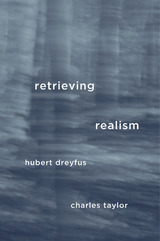
“A picture held us captive,” writes Wittgenstein in the Philosophical Investigations, describing the powerful image of mind that underlies the modern epistemological tradition from Descartes onward. Retrieving Realism offers a radical critique of the Cartesian epistemic picture that has captivated philosophy for too long and restores a realist view affirming our direct access to the everyday world and to the physical universe.
According to Descartes, knowledge exists in the form of ideas in the mind that purportedly represent the world. This “mediational” epistemology—internal ideas mediating external reality—continues to exert a grip on Western thought, and even philosophers such as Quine, Rorty, and Davidson who have claimed to refute Descartes remain imprisoned within its regime. As Hubert Dreyfus and Charles Taylor show, knowledge consists of much more than the explicit representations we formulate. We gain knowledge of the world through bodily engagement with it—by handling things, moving among them, responding to them—and these forms of knowing cannot be understood in mediational terms. Dreyfus and Taylor also contest Descartes’s privileging of the individual mind, arguing that much of our understanding of the world is necessarily shared.
Once we deconstruct Cartesian mediationalism, the problems that Hume, Kant, and many of our contemporaries still struggle with—trying to prove the existence of objects beyond our representations—fall away, as does the motivation for nonrealist doctrines. We can then begin to describe the background everyday world we are absorbed in and the universe of natural kinds discovered by science.
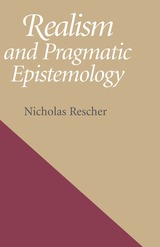
An examination of philosophical realism from the standpoint of pragmatic epistemology, this book addresses the core idea of Rescher's work in epistemology: that functional and pragmatic concerns exert a controlling influence on the conduct of rational inquiry and on the ways in which we can and should regard its products.
Pragmatism is widely regarded as a philosophical approach that stands at odds with realism, but Rescher takes a very different approach. He views pragmatism as a realistic position that can be developed from a pragmatic point of view, and utilizes a number of case studies to augment his position. Throughout, he shows how the pragmatic and purposive setting of our putative knowledge of the real world proves to be crucial for the constituting and also for the constitution of our knowledge.
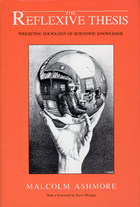

In diverse essays the authors provide fascinating studies of objectivity in such areas as anthropological research, corporate and governmental bureaucracies, legal discourse, photography, and the study and practice of the natural sciences. Taken together, Megill argues, this volume calls for developing a notion of "objectivities." The absolute sense of objectivity--that is, objectivity as a "God's eye view"--must be supplemented, and in part supplanted, by disciplinary, procedural, and dialectical senses of objectivity. This book will be of great interest to a broad range of scholars as it presents current thinking on a topic of fundamental concern across the disciplines in the humanities and social sciences.
Contributors. Barry Barnes, Dagmar Barnouw, Lorraine Code, Lorraine Daston, Johannes Fabian, Kenneth J. Gergen, Mary E. Hawkesworth, Barbara Herrnstein Smith, Evelyn Fox Keller, George Levine, Allan Megill, Peter Miller, Andy Pickering, Theodore M. Porter

Norris presents his case in a series of closely argued chapters that take issue with the relativist position. He attempts to rehabilitate the value of truth in philosophy of science by restoring a lost distinction between concept and metaphor and argues that theoretical discourse, so far from being an inconsequential activity, has very real consequences, particularly in ethics and politics. This debate has become skewed, he suggests, through the widespread and typically postmodern idea that truth-claims must always go along with a presumptive or authoritarian bid to silence opposing views. On the contrary, there is nothing as dogmatic—or as silencing—as a relativism that acknowledges no shared truth conditions for valid or responsible discourse. Norris also offers a timely reassessment of several thinkers—Althusser and Derrida among them—whose reception history has been distorted by the vagaries of short-term intellectual fashion.
Reclaiming Truth will be welcomed by readers concerned with the uses and abuses of theory at a time when such questions are in urgent need of sustained and serious debate.

Readings in Interpretation was first published in 1987. Minnesota Archive Editions uses digital technology to make long-unavailable books once again accessible, and are published unaltered from the original University of Minnesota Press editions.
Readings in Interpretation — a volume primarily on the texts of Holderlin, Hegel, and their interpreter Heidegger—locates itself strategically between literature and philosophy. In keeping with this juxtaposition, it treats the question of self-consciousness and reflection on the levels of "theme" and "text." For both Hegel and Holderlin, selfconsciousness and its relation to knowing are explicit themes, but Waminski's readings show that a more disruptive reflection is operative on the level of text.
In an argument that centers on the textual aspects of Hegel's Phenomenology of the Spirit,Warminski demonstrates that the negative moment—which is often interpreted as a prelude to a unified self-consciousness—cannot be accounted for by interpretive models drawn from outside the text—by concepts like the self, consciousness, or the subject. Instead, a completely different practice and theory is necessary. The author's "Prefatory Postscript" at the beginning of the book therefore serves as an introduction to sketch the theoretical basis of the readings that follow and as a "postscript" that explains the difference between "reading" and "interpretation" which those readings make necessary.
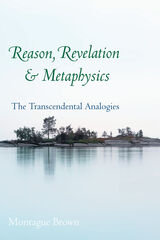
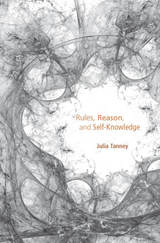
Julia Tanney offers a sustained criticism of today’s canon in philosophy of mind, which conceives the workings of the rational mind as the outcome of causal interactions between mental states that have their bases in the brain. With its roots in physicalism and functionalism, this widely accepted view provides the philosophical foundation for the cardinal tenet of the cognitive sciences: that cognition is a form of information-processing. Rules, Reason, and Self-Knowledge presents a challenge not only to the cognitivist approach that has dominated philosophy and the special sciences for the last fifty years but, more broadly, to metaphysical-empirical approaches to the study of the mind.
Responding to a tradition that owes much to the writings of Davidson, early Putnam, and Fodor, Tanney challenges this orthodoxy on its own terms. In untangling its internal inadequacies, starting with the paradoxes of irrationality, she arrives at a view these philosophers were keen to rebut—one with affinities to the work of Ryle and Wittgenstein and all but invisible to those working on the cutting edge of analytic philosophy and mind research today. This is the view that rational explanations are embedded in “thick” descriptions that are themselves sophistications upon ever ascending levels of discourse, or socio-linguistic practices.
Tanney argues that conceptual cartography rather than metaphysical-scientific explanation is the basic tool for understanding the nature of the mind. Rules, Reason, and Self-Knowledge clears the path for a return to the world-involving, circumstance-dependent, normative practices where the rational mind has its home.
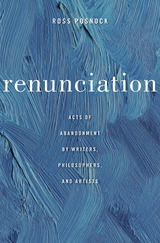
Renunciation as a creative force in the careers of writers, philosophers, and artists is the animating idea behind Ross Posnock’s new book. Taking up acts of abandonment, rejection, and refusal that have long baffled critics, he shows how renunciation has reframed the relationship of artists and intellectuals to society in productive and unpredictable ways.
In a work of remarkable synthesis that includes traditions and genres from antiquity to postmodernity, Posnock discovers connections among disparate figures ranging from Lao Tzu to Dave Chappelle and Bob Dylan. The thread running through these acts of renunciation, he argues, is an aesthetic and ethical resistance to the demand that one’s words and actions be straightforward and immediately comprehensible. Modern art in particular valorizes the nonconceptual and the intuitive, seeking to make silence articulate and incompletion fertile.
Renouncers reject not only artistic and scholarly conventions but also the public roles that attend them. Wittgenstein, Rimbaud, and Glenn Gould brazenly flouted professional and popular expectations, demanding that philosophy, poetry, music play by new rules. Emerson and Nietzsche severed all institutional ties, while William James waged a guerrilla campaign from his post at Harvard against what all three considered to be the enemy: the pernicious philosophical insistence on rationality. Posnock also examines renunciations in light of World War II—the veterans J. D. Salinger and George Oppen, and the Holocaust survivor Paul Celan—while a fourth cluster includes the mystic Thomas Merton and the abstract painters Ad Reinhardt and Agnes Martin.
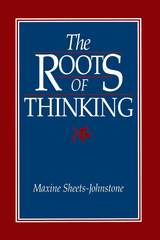
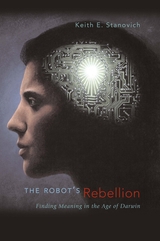
Accepting and now forcefully responding to this decentering and disturbing idea, Keith Stanovich here provides the tools for the "robot's rebellion," a program of cognitive reform necessary to advance human interests over the limited interest of the replicators and define our own autonomous goals as individual human beings. He shows how concepts of rational thinking from cognitive science interact with the logic of evolution to create opportunities for humans to structure their behavior to serve their own ends. These evaluative activities of the brain, he argues, fulfill the need that we have to ascribe significance to human life.
We may well be robots, but we are the only robots who have discovered that fact. Only by recognizing ourselves as such, argues Stanovich, can we begin to construct a concept of self based on what is truly singular about humans: that they gain control of their lives in a way unique among life forms on Earth—through rational self-determination.
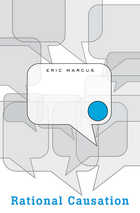
We explain what people think and do by citing their reasons, but how do such explanations work, and what do they tell us about the nature of reality? Contemporary efforts to address these questions are often motivated by the worry that our ordinary conception of rationality contains a kernel of supernaturalism—a ghostly presence that meditates on sensory messages and orchestrates behavior on the basis of its ethereal calculations. In shunning this otherworldly conception, contemporary philosophers have focused on the project of “naturalizing” the mind, viewing it as a kind of machine that converts sensory input and bodily impulse into thought and action. Eric Marcus rejects this choice between physicalism and supernaturalism as false and defends a third way.
He argues that philosophers have failed to take seriously the idea that rational explanations postulate a distinctive sort of causation—rational causation. Rational explanations do not reveal the same sorts of causal connections that explanations in the natural sciences do. Rather, rational causation draws on the theoretical and practical inferential abilities of human beings. Marcus defends this position against a wide array of physicalist arguments that have captivated philosophers of mind for decades. Along the way he provides novel views on, for example, the difference between rational and nonrational animals and the distinction between states and events.

Psychology is meant to help people cope with the afflictions of modern society. But how useful is it? Ian Parker argues that current psychological practice has become part of the problem, rather than the solution.
Ideal for undergraduates, this book deconstructs the discipline to reveal the neoliberal sensitivities that underlie its theory and practice. Psychology focuses on the happiness of 'the individual'. Yet it neglects the fact that the happiness of the individual depends on their social and political surroundings.
Ian Parker argues that a new approach to psychology is needed. He offers an alternative vision, outlining how the discipline can be linked to political practice and how it can help people as part of a wider progressive agenda. This groundbreaking book is at the cutting edge of current thinking on the discipline and should be required reading on all psychology courses.

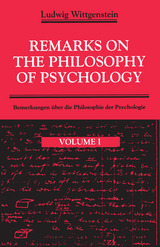
This bilingual edition of the Remarks on the Philosophy of Psychology presents the first English translation of an essential body of Wittegenstein's work. It elaborates Wittgenstein's views on psychological concepts such as expectation, sensation, knowing how to follow a rule, and knowledge of the sensations of other persons. It also shows strong emphasis on the "anthropological" aspect of Wittgenstein's thought. Philosophers, as well as anthropologists, psychologists, and sociologists will welcome this important publication.
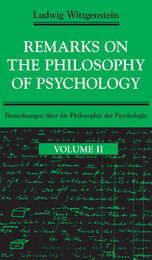
This bilingual edition of the Remarks on the Philosophy of Psychology presents the first English translation of an essential body of Wittgenstein's work. It elaborates Wittgenstein's views on psychological concepts such as expectation, sensation, knowing how to follow a rule, and knowledge of the sensations of other persons. It also shows strong emphasis on the "anthropological" aspect of Wittgenstein's thought. Philosophers, as well as anthropologists, psychologists, and sociologists will welcome this important publication.
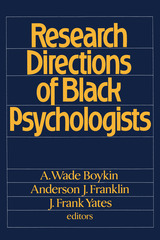
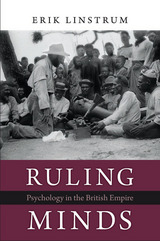
At its zenith in the early twentieth century, the British Empire ruled nearly one-quarter of the world’s inhabitants. As they worked to exercise power in diverse and distant cultures, British authorities relied to a surprising degree on the science of mind. Ruling Minds explores how psychology opened up new possibilities for governing the empire. From the mental testing of workers and soldiers to the use of psychoanalysis in development plans and counterinsurgency strategy, psychology provided tools for measuring and managing the minds of imperial subjects. But it also led to unintended consequences.
Following researchers, missionaries, and officials to the far corners of the globe, Erik Linstrum examines how they used intelligence tests, laboratory studies, and even dream analysis to chart abilities and emotions. Psychology seemed to offer portable and standardized forms of knowledge that could be applied to people everywhere. Yet it also unsettled basic assumptions of imperial rule. Some experiments undercut the racial hierarchies that propped up British dominance. Others failed to realize the orderly transformation of colonized societies that experts promised and officials hoped for. Challenging our assumptions about scientific knowledge and empire, Linstrum shows that psychology did more to expose the limits of imperial authority than to strengthen it.
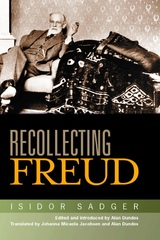
As a student, Sadger attended Freud's lectures from 1895 through 1904. Two years later Freud nominated Sadger to his Wednesday Psychological Society (later called the Viennese Psychoanalytic Society). Sadger, however, was not part of Freud's inner circle, but more a participant observer of the early years of the psychoanalytic movement and of Freud as teacher, therapist, and clinician.
Sadger was considered one of the most devoted followers of Freud and hoped to become one of Freud's "favorite sons." At the First Psychoanalytic Congress held in Salzburg in 1908, Sadger was chosen to be one of the principal speakers along with Freud, Jones, Alder, Jung, Prince, Rifkin, Abraham, and Stekel, an honor that bespeaks Sadger's early role in the movement. But Freud and many of his disciples were also openly critical of Sadger's work, calling it at various times overly simplistic, unimaginative, reductionist, orthodox, and rigid.
In 1930 Sadger published his memoir, Sigmund Freud: Persönliche Erinnerungen. With the rise of Nazism and World War II, the book became lost to the world of psychoanalytic history. Recently, Alan Dundes learned of its existence and mounted a search that led him around the world to one of the few extant copies—in a research library in Japan. The result of his fascinating quest is Recollecting Freud, a long-lost personal account that provides invaluable insights into Freud and his social, cultural, and intellectual context.
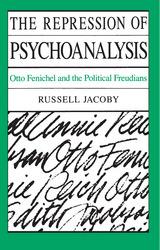

Repossessions was first published in 1998. Minnesota Archive Editions uses digital technology to make long-unavailable books once again accessible, and are published unaltered from the original University of Minnesota Press editions.
A double-edged critical forum, this volume brings early modern culture and psychoanalysis into revisionist dialogue with each other. The authors reflect on how psychoanalysis remains
"possessed" by its incorporation of early modern mythologies, visions, credos, and phantasms. Their essays explore the conceptual and ideological foundations of psychoanalysis while articulating fresh insights into the vicissitudes of autobiography, translation, mourning, and eroticism in the transitional period from the waning of feudalism to the emergence of capitalism.Employing a broad spectrum of the most recent, Continental psychoanalytic approaches, the book covers topics and figures ranging from King James to Leonardo, demonology to cartography, astronomy to cross-dressing, and mythology to biology. Its detailed readings of Boccaccio, Ficino, Finé, Michelangelo, Montaigne, and others dramatically reassess the foundational concepts of cultural history, secularization, autobiography, reason, and government. Through a sustained focus on visual and verbal residues of personal and cultural trauma, the essays generate innovative analyses of the interrelation of writing, graphic space, self, and social identification in early modern texts, paintings, maps, and other artifacts.
Contributors: Elizabeth J. Bellamy, Tom Conley, Mitchell Greenberg, Kathleen Perry Long, Julia Reinhard Lupton, Christopher Pye, Juliana Schiesari.
Timothy Murray is professor of English and director of graduate studies in Film and Video at Cornell University. Alan K. Smith is assistant professor in the Department of Languages and Literature at the University of Utah.
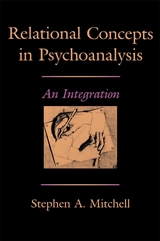
There are more psychoanalytic theories today than anyone knows what to do with, and the heterogeneity and complexity of the entire body of psychoanalytic though have become staggering. In Relational Concepts in Psychoanalysis, Stephen A. Mitchell weaves strands from the principal relational-model traditions (interpersonal psychoanalysis, British school object-relations theories, self psychology, and existential psychoanalysis) into a comprehensive approach to many of the knottiest problems and controversies in theoretical and clinical psychoanalysis.
Mitchell’s earlier book, Object Relations in Psychoanalytic Theory, co-authored with Jay Greenberg, set the stage for this current integration by providing a broad comparative analysis of important thinking on the nature of human relationships. In that classic study Greenberg and Mitchell distinguished between two basic paradigms: the drive model, in which relations with others are generated and shaped by the need for drive gratifications, and various relational models, in which relations themselves are taken as primary and irreducible. In Relational Concepts in Psychoanalysis, Mitchell argues that the drive model has since outlived its usefulness. The relational model, on the other hand, has been developed piecemeal by different authors who rarely acknowledge and explore the commonality of their assumptions or the rich complementarity of their perspectives.
In this bold effort at integrative theorizing, Mitchell draws together major lines of relational-model traditions into a unified framework for psychoanalytic thought, more economical than the anachronistic drive model and more inclusive than any of the singular relational approaches to the core significance of sexuality, the impact of early experience, the relation of the past to the present, the interpenetration of illusion and actuality, the centrality of the will, the repetition of painful experience, the nature of analytic situation, and the process of analytic change. As such, his book will be required reading for psychoanalytic scholars, practitioners, candidates in psychoanalysis, and students in the field.
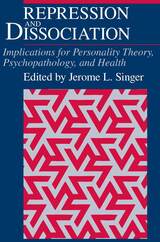
"Rarely does a volume present contributions on a controversial topic from such distinguished clinicians and experimentalists . . . . There is something of interest in this volume for almost anyone involved in experimental cognitive psychology and psychiatry."—Carroll E. Izard, Contemporary Psychology
"The concept of repression is the cornerstone of psychoanalytic theory. . . . This is a delightful book, unusually well-written. . . . Recommended."—Choice
"Readable, thorough, wide ranging and consistently interesting. . . . A testament to the continuing power of psychodynamic ideas when faced with individual psychopathology."—Sue Llewelyn, Psychologist
"Singer has brought together some of the best empirical research in the areas of unconscious mental activity and repression—that is at once interdisciplinary and scholarly."—Howard D. Lerner, International Review of Psycho-analysis
"A rich reference, replete with summaries and citations, covering a variety of topics related to the psychology of repression and dissociation. . . . A thoughtful, detailed and eclectic discussion of the scientific and theoretical basis of repression and dissociation."—Steven Lazrove, M.D., American Journal of Psychiatry
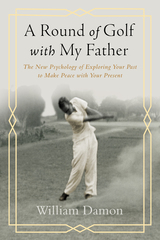
Viewing our past through the eyes of maturity can reveal insights that our younger selves could not see. Lessons that eluded us become apparent. Encounters that once felt like misfortunes now become understood as valued parts of who we are. We realize what we’ve learned and what we have to teach. And we’re encouraged to chart a future that is rich with purpose.
In A Round of Golf with My Father, William Damon introduces us to the “life review.” This is a process of looking with clarity and curiosity at the paths we’ve traveled, examining our pasts in a frank yet positive manner, and using what we’ve learned to write purposeful next chapters for our lives.
For Damon, that process began by uncovering the mysterious life of his father, whom he never met and never gave much thought to. What he discovered surprised him so greatly that he was moved to reassess the events of his own life, including the choices he made, the relationships he forged, and the career he pursued.
Early in his life, Damon was led to believe that his father had been killed in World War II. But the man survived and went on to live a second life abroad. He married a French ballerina, started a new family, and forged a significant Foreign Service career. He also was an excellent golfer, a bittersweet revelation for Damon, who wishes that his father had been around to teach him the game.
We follow Damon as he struggles to make sense of his father’s contradictions and how his father, even though living a world apart, influenced Damon’s own development in crucial ways. In his life review, Damon uses what he learned about his father to enhance his own newly emerging self-knowledge.
Readers of this book may come away inspired to conduct informal life reviews for themselves. By uncovering and assembling the often overlooked puzzle pieces of their pasts, readers can seek present-day contentment and look with growing optimism to the years ahead.

Sketching out the scientific foundations for a unified theory of repression that integrates the findings of the laboratory and the clinic, this comprehensive and authoritative synthesis of a century of memory research will be crucial reading for psychologists and clinicians, as well as forensic and legal professionals interested in the recovery of "inaccessible" memories.
"By debunking hypnosis, [Erdelyi] has allowed the debate on memory to move forward. . . . Erdelyi's work on hypermnesia is very important to our understanding of the mechanisms of memory and the brain."—Janet D. Feigenbaum, Times Literary Supplement
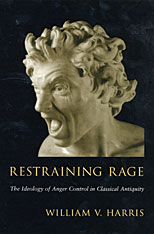
The angry emotions, and the problems they presented, were an ancient Greek preoccupation from Homer to late antiquity. From the first lines of the Iliad to the church fathers of the fourth century A.D., the control or elimination of rage was an obsessive concern. From the Greek world it passed to the Romans.
Drawing on a wide range of ancient texts, and on recent work in anthropology and psychology, Restraining Rage explains the rise and persistence of this concern. W. V. Harris shows that the discourse of anger-control was of crucial importance in several different spheres, in politics--both republican and monarchical--in the family, and in the slave economy. He suggests that it played a special role in maintaining male domination over women. He explores the working out of these themes in Attic tragedy, in the great Greek historians, in Aristotle and the Hellenistic philosophers, and in many other kinds of texts.
From the time of Plato onward, educated Greeks developed a strong conscious interest in their own psychic health. Emotional control was part of this. Harris offers a new theory to explain this interest, and a history of the anger-therapy that derived from it. He ends by suggesting some contemporary lessons that can be drawn from the Greek and Roman experience.
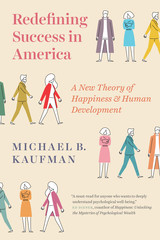
Returning to the legendary Harvard Student Study of undergraduates from the 1960s and interviewing participants almost fifty years later, Kaufman shows that formative experiences in family, school, and community largely shape a future adult’s worldview and well-being by late adolescence, and that fundamental change in adulthood, when it occurs, is shaped by adult family experiences, not by ever-greater competitive success. Published research on general samples shows that these patterns, and the book’s findings generally, are broadly applicable to demographically varied populations in the United States.
Leveraging biography-length clinical interviews and quantitative evidence unmatched even by earlier landmark studies of human development, Redefining Success in America redefines the conversation about the nature and origins of happiness, and about how adults develop. This longitudinal study pioneers a new paradigm in happiness research, developmental science, and personality psychology that will appeal to scholars and students in the social sciences, psychotherapy professionals, and serious readers navigating the competitive journey.
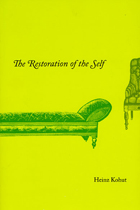
In his foundational work The Restoration of the Self, noted psychoanalyst Heinz Kohut boldly challenges what he called “the limits of classical analytic theory” and the Freudian orthodoxy. Here Kohut proposes a “psychology of the self” as a theory in its own right—one that can stand beside the teachings of Freud and Jung.
Using clinical data, Kohut explores issues such as the role of narcissism in personality, when a patient can be considered cured, and the oversimplifications and social biases that unduly influenced Freudian thought. This volume puts forth some of Kohut’s most influential ideas on achieving emotional health through a balanced, creative, and joyful sense of self.
"Kohut speaks clearly from his identity as a psychoanalyst-healer, showing that he is more of a psychoanalyst than most, and yet calling for major theoretical revisions including a redefinition of the essence of psychoanalysis.”—American Journal of Psychotherapy
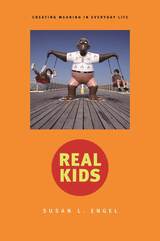
Decades of work in psychology labs have vastly enhanced our knowledge about how children perceive, think, and reason. But it has also encouraged a distorted view of children, argues psychologist Susan Engel in this provocative and passionate book--a view that has affected every parent who has tried to debate with a six-year-old. By focusing on the thinking processes prized by adults, too many expert opinions have rendered children as little adults. What has been lost is what is truly unique and mysterious--the childlike quality of a child's mind.
Engel draws on keen observations and descriptive research to take us into the nearly forgotten, untidy, phantasmagorical world of children's inner lives. She reminds us that children fuse thought and emotion, play and reality; they swing wildly between different ways of interpreting and acting in the world. But just as a gawky child may grow into a beauty, illogical and sometimes maddening childishness can foreshadow great adult ability.
Engel argues that the "scientist in a crib" view encourages parents and teachers to expect more logical reasoning and emotional self-control from children than they possess. She provides a concise and valuable overview of what modern developmental psychologists have learned about children's developing powers of perception and capacity for reasoning, but also suggests new ways of studying children that better capture the truth about their young minds.
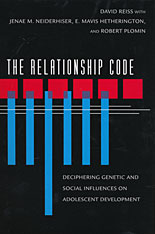
The Relationship Code is the report of a longitudinal study, conducted over a ten-year period, of the influence of family relationships and genetic factors on competence and psychopathology in adolescent development. The sample for this landmark study included 720 pairs of same-sex adolescent siblings—including twins, half siblings, and genetically unrelated siblings—and their parents.
Using a clear expressive style, David Reiss and his coinvestigators identify specific mechanisms that link genetic factors and the social environment in psychological development. They propose a striking hypothesis: family relationships are crucial to the expression of genetic influences on a broad array of complex behaviors in adolescents. Moreover, this role of family relationships may be very specific: some genetic factors are linked to mother–child relationships, others to father–child relations, some to relationship warmth, while others are linked to relationship conflict or control. The specificity of these links suggests that family relationships may constitute a code for translating genetic influences into the ontogeny of behaviors, a code every bit as important for behavior as DNA-RNA.
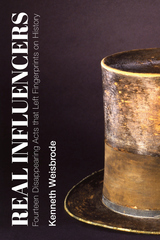
"The influencer is a person who made an art of absence in the trade of cultural and sometimes political capital. The ones in this book represent a range of vocations, from politics to diplomacy to novel-writing, but almost all were cultural entrepreneurs. They were not puppet masters, gray eminences, unsung heroes, or Svengalis––although one or two have been portrayed thus. Rather, their influence is spread by virtue of their willful disappearance, of its perpetuation of a new language and cultural standard, and of their many conscious and unconscious imitators. The reason they had such influence was precisely because a part of their method was to be less visible in order to watch their ideas, habits, and styles proliferate without their names necessarily being affixed. […] Yet, to understand such a modus operandi is necessary today when the proliferation of social media influencers are squandering cultural capital so quickly by the simultaneous promotion of their products, above all, themselves."
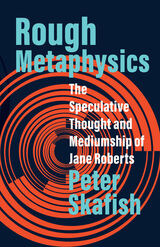
A powerful case for why anthropology should study outsiders of thought and their speculative ideas
What sort of thinking is needed to study anomalies in thought? In this trenchantly argued and beautifully written book, anthropologist Peter Skafish explores this provocative question by examining the writings of the medium and “rough metaphysician” Jane Roberts (1929–1984). Through a close interpretation of her own published texts as well as those she understood herself to have dictated for her cohort of channeled personalities—including one, named “Seth,” who would inspire the New Age movement—Skafish shows her intuitive and dreamlike work to be a source of rigorously inventive ideas about science, ontology, translation, and pluralism. Arguing that Roberts’s writings contain philosophies ahead of their time, he also asks: How might our understanding of speculative thinking change if we consider the way untrained writers, occult visionaries, and their counterparts in other cultural traditions undertake it? What can outsider thinkers teach us about the limitations of even our most critical intellectual habits?
Rough Metaphysics is at once an ethnography of the books of a strange and yet remarkable writer, a commentary on the unlikely philosophy contained in them, and a call for a new way of doing (and undoing) philosophy through anthropology, and vice versa. In guiding the reader through Roberts’s often hallucinatory “world of concepts,” Skafish also develops a series of original interpretations of thinkers—from William James to Claude Lévi-Strauss to Paul Feyerabend—who have been vital to anthropologists and their fellow travelers.
Seductively written and surprising in its turns of thought, Rough Metaphysics is a feast for anyone who wants to learn how to think something new, especially about thought.
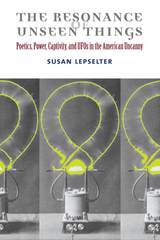
“We really don’t have anything like this in terms of a focused, sympathetic, open-minded ethnographic study of UFO experiencers. . . . The author’s semiotic approach to the paranormal is immensely productive, positive, and, above all, resonant with what actually happens in history.”
—Jeffrey J. Kripal, J. Newton Rayzor Professor of Religion, Rice University
“Lepselter relates a weave of intimate alien sensibilities in out-off-the-way places which are surprisingly, profoundly, close to home. Readers can expect to share her experience of contact with complex logics of feeling, and to do so in a contemporary America they may have thought they understood.”
—Debbora Battaglia, Mount Holyoke College
“An original and beautifully written study of contemporary American cultural poetics. . . . The book convincingly brings into relief the anxieties of those at the margins of American economic and civic life, their perceptions of state power, and the narrative continuities that bond them to histories of violence and expansion in the American West.”
—Deirdre de la Cruz, University of Michigan
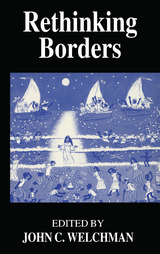
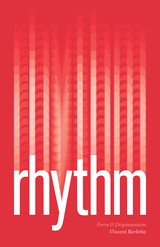
Vincent Barletta explores rhythm through three historical moments, each addressing it as a phenomenon that transcends poetry, aesthetics, and even temporality. He reveals rhythm to be a power that holds us in place, dispossesses us, and shapes the foundations of our world. In these moments, Barletta encounters rhythm as a primordial and physical binding force that establishes order and form in the ancient world, as the anatomy of lived experience in early modern Europe, and as a subject of aesthetic and ethical questioning in the twentieth century.
A wide-ranging book covering a period spanning two millennia and texts from over ten languages, Rhythm will expand the conversation around this complex and powerful phenomenon.
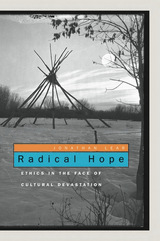
Shortly before he died, Plenty Coups, the last great Chief of the Crow Nation, told his story—up to a certain point. “When the buffalo went away the hearts of my people fell to the ground,” he said, “and they could not lift them up again. After this nothing happened.” It is precisely this point—that of a people faced with the end of their way of life—that prompts the philosophical and ethical inquiry pursued in Radical Hope. In Jonathan Lear’s view, Plenty Coups’s story raises a profound ethical question that transcends his time and challenges us all: how should one face the possibility that one’s culture might collapse?
This is a vulnerability that affects us all—insofar as we are all inhabitants of a civilization, and civilizations are themselves vulnerable to historical forces. How should we live with this vulnerability? Can we make any sense of facing up to such a challenge courageously? Using the available anthropology and history of the Indian tribes during their confinement to reservations, and drawing on philosophy and psychoanalytic theory, Lear explores the story of the Crow Nation at an impasse as it bears upon these questions—and these questions as they bear upon our own place in the world. His book is a deeply revealing, and deeply moving, philosophical inquiry into a peculiar vulnerability that goes to the heart of the human condition.

The concept of a right is fundamental to moral, political, and legal thinking, but much of the use of that concept is selective and fragmentary: it is common merely to appeal to this or that intuitively plausible attribution of rights as needed for purposes of argument. In The Realm of Rights Judith Thomson provides a full-scale, systematic theory of human and social rights, bringing out what in general makes an attribution of a right true.
Thomson says that the question what it is to have a right precedes the question which rights we have, and she therefore begins by asking why our having rights is a morally significant fact about us. She argues that a person’s having a right is reducible to a complex moral constraint: central to that constraint is that, other things being equal, the right ought to be accorded. Thomson asks what those other things are that may or may not be equal, and describes the tradeoffs that relieve us of the requirement to accord a right.
Our rights fall into two classes, those we have by virtue of being human beings and those we have by virtue of private interactions and law. Thomson argues that the first class includes rights that others not kill or harm us, but does not include rights that others meet our needs. The second class includes rights that issue from promises and consent, and Thomson shows how they are generated; she also argues that property rights issue only from a legitimate legal system, so that the second class includes them as well.
The Realm of Rights will take its place as a major effort to provide a stable foundation for our deeply held belief that we are not mere cogs in a communal machine, but are instead individuals whose private interests are entitled to respect.
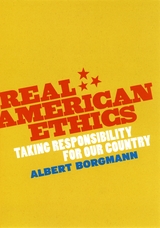
America is a wonderful and magnificent country that affords its citizens the broadest freedoms and the greatest prosperity in the world. But it also has its share of warts. It is embroiled in a war that many of its citizens consider unjust and even illegal. It continues to ravage the natural environment and ignore poverty both at home and abroad, and its culture is increasingly driven by materialism and consumerism. But America, for better or for worse, is still a nation that we have built. So why then, asks Albert Borgmann in this most timely and urgent work, are we failing to take responsibility for it?
In Real American Ethics, Borgmann asks us to reevaluate our role in the making of American values. Taking his cue from Winston Churchill—who once observed that we shape our buildings, and then our buildings shape us—Borgmann considers the power of our most enduring institutions and the condition of our present moral makeup to propose inspired new ways in which we, as ordinary citizens, can act to improve our country. This, he shows, includes everything from where we choose to live and what we spend our money on to daunting tasks like the reshaping of our cities—habits and actions that can guide us to more accomplished and virtuous lives. Using prose that is easy and direct throughout, Borgmann’s position is grounded neither by conservative nor liberal ideology, but in his understanding that he is a devoted citizen among many.
In an age in which the blame game is the only game in town, this patriotic book is an eloquent reminder of the political strength we all wield when we work together.

Some acts are wrong, even if they have good results, and some are right even if the world would have been a better place without them. Here is a cogent and lucid argument for a system of morality that makes place for that which is right or wrong in itself and not just according to consequences. Charles Fried develops in this book a conception of right and wrong that supports judgments on subjects as various as tax structure, self-defense, kidney transplants, tort liability, and freedom of speech.
Fried begins by examining the demands of morality in two quite different cases: harming the innocent (where ordinary moral consciousness suggests absolutes) and lying (where consequences seem pertinent). Upon this foundation he elaborates a theory of rights that accounts for the obligation to contribute to the welfare of others but accounts also for the limits of that obligation. Comparisons and contrasts are drawn to economic theories of rights, and to the writings of Dworkin, Nozick, and Rawls. Finally, Fried considers how choices made within personal and professional roles—by friends and kin, by doctors and lawyers—are susceptible of moral judgment.
Right and Wrong will have an impact on ethical, legal, and social theory, and will profit anyone thinking about the requirements of a moral life.
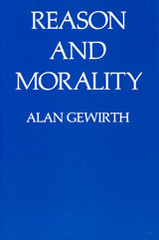
"This is a fascinating study of an apparently intractable problem. Gewirth has provided plenty of material for further discussion, and his theory deserves serious consideration. He is always aware of possible rejoinders and argues in a rigorous manner, showing a firm grasp of the current state of moral and political philosophy."—Mind
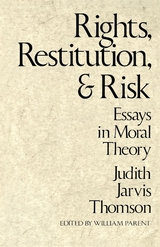
Moral theory should be simple: the moral theorist attends to ordinary human action to explain what makes some acts right and others wrong, and we need no microscope to observe a human act. Yet no moral theory that is simple captures all of the morally relevant facts.
In a set of vivid examples, stories, and cases Judith Thomson shows just how wide an array of moral considerations bears on all but the simplest of problems. She is a philosophical analyst of the highest caliber who can tease a multitude of implications out of the story of a mere bit of eavesdropping. She is also a master teller of tales which have a philosophical bite. Beyond these pleasures, however, she brings new depth of understanding to some of the most pressing moral issues of the moment, notably abortion. Thomson’s essays determinedly confront the most difficult questions: What is it to have a moral right to life, or any other right? What is the relation between the infringement of such rights and restitution? How is rights theory to deal with the imposition of risk?
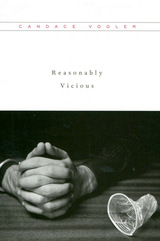
Is unethical conduct necessarily irrational? Answering this question requires giving an account of practical reason, of practical good, and of the source or point of wrongdoing. By the time most contemporary philosophers have done the first two, they have lost sight of the third, chalking up bad action to rashness, weakness of will, or ignorance. In this book, Candace Vogler does all three, taking as her guides scholars who contemplated why some people perform evil deeds. In doing so, she sets out to at once engage and redirect contemporary debates about ethics, practical reason, and normativity.
Staged as a limited defense of a standard view of practical reason (an ancestor of contemporary instrumentalist views), Vogler's essay develops Aquinas's remark about three ways an action might be desirable into an exhaustive system for categorizing reasons for acting. Drawing on Elizabeth Anscombe's pioneering work on intention, Vogler argues that one sort (means/end or calculative reasons for acting) sets the terms for all sound work on practical rationality.
She takes up Aquinas's work on evil throughout, arguing that he provides us with a systematic theory of immorality that takes seriously the goods at issue in wrongdoing and the reasons for unethical conduct. Vogler argues that, shorn of its theological context, this theory leaves us with no systematic, uncontroversial way of arguing that wrongdoing is necessarily contrary to reason.
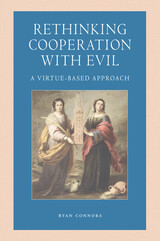
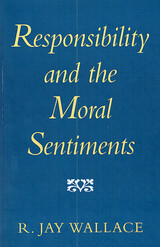

Most current talk of forgiveness and reconciliation in the aftermath of collective violence proceeds from an assumption that forgiveness is always superior to resentment and refusal to forgive. Victims who demonstrate a willingness to forgive are often celebrated as virtuous moral models, while those who refuse to forgive are frequently seen as suffering from a pathology. Resentment is viewed as a negative state, held by victims who are not "ready" or "capable" of forgiving and healing.
Resentment's Virtue offers a new, more nuanced view. Building on the writings of Holocaust survivor Jean Améry and the work of the South African Truth and Reconciliation Commission, Thomas Brudholm argues that the preservation of resentment can be the reflex of a moral protest that might be as permissible, humane or honorable as the willingness to forgive. Taking into account the experiences of victims, the findings of truth commissions, and studies of mass atrocities, Brudholm seeks to enrich the philosophical understanding of resentment.
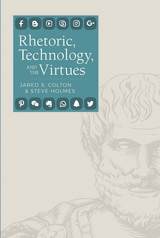
Rhetoric, Technology, and the Virtues argues that virtue ethics supports postmodern criticisms of rational autonomy and universalism while also enabling a discussion of the actual ethical behaviors that digital users form through their particular communicative ends and various rhetorical purposes. Authors Jared Colton and Steve Holmes extend Aristotle’s hexis framework through contemporary virtue ethicists and political theorists whose writing works from a tacit virtue ethics framework. They examine these key theorists through a range of case studies of digital habits of human users, including closed captioning, trolling, sampling, remixing, gamifying for environmental causes, and using social media, alongside a consideration of the ethical habits of nonhuman actors.
Tackling a needed topic with clarity and defined organization, Rhetoric, Technology, and the Virtues carefully synthesizes various strands of ethical thinking, convincingly argues that virtue ethics is a viable framework for digital rhetoric, and provides a practical way to assess the changing hexeis encountered across the network of ethical situations in the digital world.

In our globalized world, differing conceptions of human nature and human values raise questions as to whether universal and partisan claims and perspectives can be reconciled, whether interreligious and intercultural conversations can help build human community, and whether a pluralistic ethos can transcend uncompromising notions as to what is true, good, and just.
In this volume, world-class scholars from religious studies, the humanities, and the social sciences explore what it means to be human through a multiplicity of lives in time and place as different as fourth-century BCE China and the world of an Alzheimer’s patient today. Refusing the binary, these essays go beyond description to theories of aging and acceptance, ethics in caregiving, and the role of ritual in healing the inevitable divide between the human and the ideal.
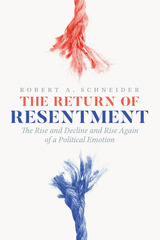
The term “resentment,” often casually paired with words like “hatred,” “rage,” and “fear,” has dominated US news analysis since November 2016. Despite its increased use, this word seems to defy easy categorization. Does “resentment” describe many interlocking sentiments, or is it just another way of saying “anger”? Does it suggest an irrational grievance, as opposed to a legitimate callout of injustice? Does it imply political leanings, or is it nonpartisan by nature?
In The Return of Resentment, Robert A. Schneider explores these questions and more, moving from eighteenth-century Britain to the aftermath of the French Revolution to social movements throughout the twentieth century. Drawing on a wide range of writers, thinkers, and historical experiences, Schneider illustrates how resentment has morphed across time, coming to express a collective sentiment felt by people and movements across the political spectrum. In this history, we discover resentment’s modernity and its ambiguity—how it can be used to dismiss legitimate critique and explain away violence, but also convey a moral stance that demands recognition. Schneider anatomizes the many ways resentment has been used to label present-day movements, from followers of Trump and supporters of Brexit to radical Islamicists and proponents of identity politics. Addressing our contemporary political situation in a novel way, The Return of Resentment challenges us to think critically about the roles different emotions play in politics.
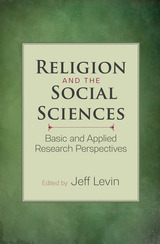
To give this research the attention it deserves, editor Jeff Levin assembled a panel of preeminent social scientists and gave them a single directive: write the ultimate statement on religion from within their respective social science discipline or field. The result is this single volume, “state-of-the-science” compendium—a first of its kind for the study of religion.
Composed of ten essays, this book details the study of religion within nine basic and applied areas of social science. Along with a critical introduction to this subject, these essays include the expert contributions of:
- Kenneth I. Pargament & Julie J. Exline on psychology
- Anthony Gill on political science
- Charles M. North on economics
- Barry Hankins on history
- Annette Mahoney on family studies
- Byron R. Johnson on criminology
- Linda K. George on gerontology
- William H. Jeynes on education
- Jeff Levin on epidemiology
- An introduction to the history of the discipline’s or field’s religious research, as well as its most important people and published works.
- A comprehensive overview of key research findings and theories.
- A detailed research agenda to guide future scholars.
- An annotated bibliography of seminal works for the reader’s further consideration.
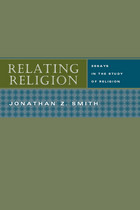
Smith first explains how he was drawn to the study of religion, outlines his own theoretical commitments, and draws the connections between his thinking and his concerns for general education. He then engages several figures and traditions that serve to define his interests within the larger setting of the discipline. The essays that follow consider the role of taxonomy and classification in the study of religion, the construction of difference, and the procedures of generalization and redescription that Smith takes to be key to the comparative enterprise. The final essays deploy features of Smith's most recent work, especially the notion of translation.
Heady, original, and provocative, Relating Religion is certain to be hailed as a landmark in the academic study and critical theory of religion.
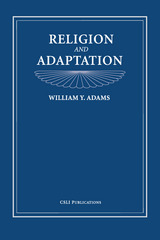
The volume uses a wide variety of ethnographic and historical sources to support its analysis, beginning with two detailed case studies of the religions practiced by Navajo Indians and Arab villagers. An intriguing comparison of these two systems of faith reveals the difficulty of finding one definition of religion. William Adams explores this problem of definition, suggesting that religion and science actually share the role of providing logical explanations in human society. In subsequent chapters, he considers the development of religious systems, the growth of religious consciousness in the individual, and the dynamics of religious change. The book ultimately aims to be a purely empirical study that probes the reasons for the existence of religion and its role as a moral and stabilizing force in human societies.
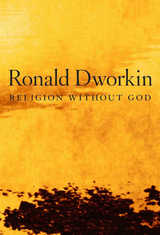
In his last book, Ronald Dworkin addresses questions that men and women have asked through the ages: What is religion and what is God’s place in it? What is death and what is immortality? Based on the 2011 Einstein Lectures, Religion without God is inspired by remarks Einstein made that if religion consists of awe toward mysteries which “manifest themselves in the highest wisdom and the most radiant beauty, and which our dull faculties can comprehend only in the most primitive forms,” then, he, Einstein, was a religious person.
Dworkin joins Einstein’s sense of cosmic mystery and beauty to the claim that value is objective, independent of mind, and immanent in the world. He rejects the metaphysics of naturalism—that nothing is real except what can be studied by the natural sciences. Belief in God is one manifestation of this deeper worldview, but not the only one. The conviction that God underwrites value presupposes a prior commitment to the independent reality of that value—a commitment that is available to nonbelievers as well. So theists share a commitment with some atheists that is more fundamental than what divides them. Freedom of religion should flow not from a respect for belief in God but from the right to ethical independence.
Dworkin hoped that this short book would contribute to rational conversation and the softening of religious fear and hatred. Religion without God is the work of a humanist who recognized both the possibilities and limitations of humanity.
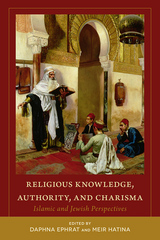
The issue of religious authority has long fascinated and ignited scholars across a range of disciplines: history, anthropology, the sociology of religion, and political science. Religious Knowledge, Authority, and Charisma juxtaposes religious leadership in premodern and modern Islam with examples from the Judaic tradition. By illustrating various iterations of authority in numerous historical and cultural contexts, this volume offers fresh insights into the nature of institutions of learning and other systems of establishing and disseminating authority, the mechanisms for cultivating committed adherents, and the processes by which religious leadership is polarized and fragmented.
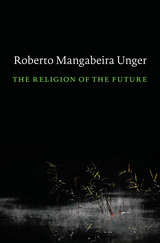
How can we live in such a way that we die only once? How can we organize a society that gives us a better chance to be fully alive? How can we reinvent religion so that it liberates us instead of consoling us?
These questions stand at the center of Roberto Mangabeira Unger’s The Religion of the Future. Both a book about religion and a religious work in its own right, it proposes the content of a religion that can survive faith in a transcendent God and in life after death. According to this religion—the religion of the future—human beings can be more human by becoming more godlike, not just later, in another life or another time, but right now, on Earth and in their own lives.
Unger begins by facing the irreparable flaws in the human condition: our mortality, groundlessness, and insatiability. He goes on to discuss the conflicting approaches to existence that have dominated the last 2,500 years of the history of religion. Turning next to the religious revolution that we now require, he explores the political ideal of this revolution, an idea of deep freedom. And he develops its moral vision, focused on a refusal to squander life.
The Religion of the Future advances Unger’s philosophical program: a philosophy for which history is open, the new can happen, and belittlement need not be our fate.
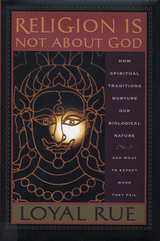
Thousands of religious traditions have appeared over the course of human history but only a relative few have survived. Some speak of a myriad of gods, others of only one, and some recognize no gods at all. Volumes have been written attempting to prove the existence or nonexistence of supernatural being(s). So, if religion is not about God, then what is it about?
In this provocative book, Loyal Rue contends that religion, very basically, is about us. Successful religions are narrative (myth) traditions that influence human nature so that we might think, feel, and act in ways that are good for us, both individually and collectively. Through the use of images, symbols, and rituals, religion promotes reproductive fitness and survival through the facilitation of harmonious social relations. Drawing on examples from the major traditions—Judaism, Christianity, Islam, Hinduism, and Buddhism—Rue shows how each religion, in its own way, has guided human behavior to advance the twin goals of personal fulfillment and social coherence.
As all faiths are increasingly faced with a crisis of intellectual plausibility and moral relevance, this book presents a compelling and positive view of the centrality and meaning of religion.
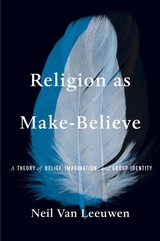
To understand the nature of religious belief, we must look at how our minds process the world of imagination and make-believe.
We often assume that religious beliefs are no different in kind from ordinary factual beliefs—that believing in the existence of God or of supernatural entities that hear our prayers is akin to believing that May comes before June. Neil Van Leeuwen shows that, in fact, these two forms of belief are strikingly different. Our brains do not process religious beliefs like they do beliefs concerning mundane reality; instead, empirical findings show that religious beliefs function like the imaginings that guide make-believe play.
Van Leeuwen argues that religious belief—which he terms religious “credence”—is best understood as a form of imagination that people use to define the identity of their group and express the values they hold sacred. When a person pretends, they navigate the world by consulting two maps: the first represents mundane reality, and the second superimposes the features of the imagined world atop the first. Drawing on psychological, linguistic, and anthropological evidence, Van Leeuwen posits that religious communities operate in much the same way, consulting a factual-belief map that represents ordinary objects and events and a religious-credence map that accords these objects and events imagined sacred and supernatural significance.
It is hardly controversial to suggest that religion has a social function, but Religion as Make-Believe breaks new ground by theorizing the underlying cognitive mechanisms. Once we recognize that our minds process factual and religious beliefs in fundamentally different ways, we can gain deeper understanding of the complex individual and group psychology of religious faith.
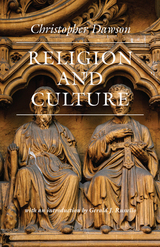
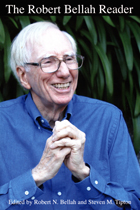
The Reader is organized around four central concerns. It seeks to place modernity in theoretical and historical perspective, drawing from major figures in social science, historical and contemporary, from Aristotle and Rousseau through Durkheim and Weber to Habermas and Mary Douglas. It takes the United States to be in some respects the type-case of modernity and in others the most atypical of modern societies, analyzing its common faith in individual freedom and democratic self-government, and its persistent paradoxes of inequality, exclusion, and empire. The Reader is also concerned to test the axiomatic modern assumption that rational cognition and moral evaluation, fact and value, are absolutely divided, arguing instead that they overlap and interact much more than conventional wisdom in the university today usually admits. Finally, it criticizes modernity’s affirmation that faith and knowledge stand even more utterly at odds, arguing instead that their overlap and interaction, obvious in every premodern society, animate the modern world as well.
Through such critical and constructive inquiry this Reader probes many of our deepest social and cultural quandaries, quandaries that put modernity itself, with all its immense achievements, at mortal risk. Through the practical self-understanding such inquiry spurs, Bellah shows how we may share responsibility for the world we have made and seek to heal it.
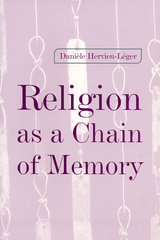
For most of the last twenty years, sociologists have studied the “decline” of religion in the modern world—a decline they saw as a defining feature of modernity, which promotes materialism over spirituality. The revival and political strength of varying religious traditions around the world, however, has forced sociologists to reconsider.
This paradox has led Hervieu-Léger to undertake a sociological redefinition and reexamination of religion. For religion to endure in the modern world, she finds, it must have deep roots in traditions and times in which it was not defined as irrelevant. This reasoning leads her to develop the concept of a “chain of memory”—a process by which individual believers become members of a community that links past, present, and future members. Thus, like cultural tradition, religion may be understood as a shared understanding with a collective memory that enables it to draw upon the deep well of its past for nourishment in the increasingly secular present.
Hervieu-Legér also argues that the modern secular societies of the West have not, as is commonly assumed, outgrown or found secular substitutes for religious traditions; nor are they more “rational” than past societies. Rather, modern societies have become “amnesiacs,” no longer able to maintain the chain of memory that binds them to their religious pasts. Ironically, however, even as the modern world is destroying and losing touch with its traditional religious bases, it is also creating the need for a spiritual life and is thus opening up a space that only religion can fill.
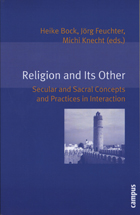

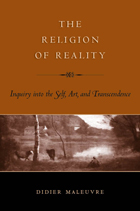
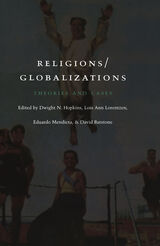
As the contributors to this work suggest, a crucial component of globalization—the breakdown of familiar boundaries and power balances—may open a space in which religion can be deployed to help refabricate new communities. Examples of such deployments can be found in the workings of liberation theology in Latin America. In other cases, however, the operations of globalization have provided a space for strident religious nationalism and identity disputes to flourish. Is there in fact a dialectical tension between religion and globalization, a codependence and codeterminism? While religion can be seen as a globalizing force, it has also been transformed and even victimized by globalization.
A provocative assessment of a contemporary phenomenon with both cultural and political dimensions, Religions/Globalizations will interest not only scholars in religious studies but also those studying Latin America, the Middle East, South Asia, and Africa.
Contributors. David Batstone, Berit Bretthauer, Enrique Dussel, Dwight N. Hopkins, Mark Juergensmeyer, Lois Ann Lorentzen, Eduardo Mendieta, Vijaya Rettakudi Nagarajan, Kathryn Poethig, Lamin Sanneh, Linda E. Thomas
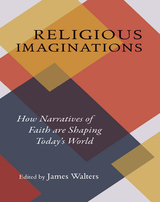
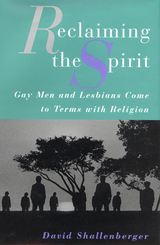
In a world in which religion and homosexuality are often by definition incompatible, it is crucial to hear from gay men and women about how they perceive themselves to be religious or spiritual people. Eliciting powerful, frank, and sometimes troubling responses, David Shallenberger interviewed gay men and women who grew up in families that belonged to traditional religions-Jewish, Roman Catholic, and Protestant-that rejected homosexuality as an unacceptable life-style. When these children grew into adulthood and "came out," many rejected the religion of their childhood as they sought out a more accepting gay community. But once they became comfortable with their new gay identity, they began to experience a spiritual hunger and a desire to be part of a religious community. Some sought to return to the traditions from which they came; others desired membership in new religious communities.
The quest for an integration of homosexuality and spirituality is the focus of Reclaiming the Spirit. Shallenberger asks how individuals can balance both a gay and a religious identity, whether coming out is a spiritual experience, and how coming out affects an individual's relationship to a traditional religious community. Divided into chapters that correspond to the common stages of spiritual integration, Reclaiming the Spirit is immensely readable and introduces an important group of voices into the hotly contested debates surrounding religion and gay participation.
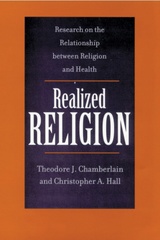
Realized Religion includes research that investigates the impact of spirituality in health and healing, faith healing, religion and mental health, religion and life satisfaction, religion and mental disorders, religion and martial satisfaction, the effect of religion on suicide, and the effect of religion on alcohol use and abuse. This book documents over 300 scientific studies published by reputable scientific journals demonstrating that religion has an ameliorating effect on the survival rate of surgical patients, on depression and anxiety, on suicide rates, and on promotion of a healthy lifestyle.
Realized Religion presents useful and helpful information to researchers and scholars who seek to understand the subtle connection between healing and spirituality. It will be an invaluable resource for libraries and others interested in the emerging field of spirituality and healing.
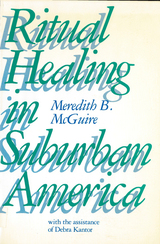

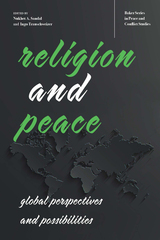
Can religion help societies achieve peace and stability? What actions can religious leaders take to facilitate conflict resolution? This book addresses these critical questions in terms of numerous contemporary conflicts within and between countries.
In the aftermath of the 9/11 attacks, public attention to religion shifted away from its relationship to politics and toward its connection to violence in civil conflicts, wars, and terrorism. Religion’s role in sowing discord became more prominent than its ability to unify. Only recently have discussions turned toward the positive impact of religion and spirituality in the public sphere and to the role of faith in resolving diplomatic, political, and social problems. The essays in this book contribute to this discourse by examining past, present, and future opportunities to promote peace through religion and spirituality.
The contributors to this volume explore topics such as humanitarianism, philosophy, counterextremism, human rights, rituals, populism, foreign policy, and environmentalism. Some of the chapters approach these topics from a transnational perspective, while others focus on specific countries in Africa, Asia, Europe, Latin America, and the Middle East.
Contributors:
- Jonathan C. Agensky
- Slavica Jakelić
- Afra Jalabi
- Brandon Kendhammer
- Loren D. Lybarger
- Cecelia Lynch
- Peter Mandaville
- Jeremy Rinker
- Margaret M. Scull
- Amy Erica Smith
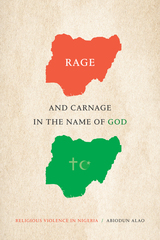
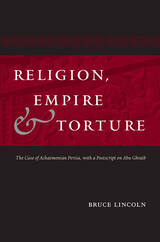
Lincoln identifies three core components of an imperial theology that have transhistorical and contemporary relevance: dualistic ethics, a theory of divine election, and a sense of salvific mission. Beyond this, he asks, how did the Achaemenians understand their place in the cosmos and their moral status in relation to others? Why did they feel called to intervene in the struggle between good and evil? What was their sense of historic purpose, especially their desire to restore paradise lost? And how did this lead them to deal with enemies and critics as imperial power ran its course? Lincoln shows how these religious ideas shaped Achaemenian practice and brought the Persians unprecedented wealth, power, and territory, but also produced unmanageable contradictions, as in a gruesome case of torture discussed in the book’s final chapter. Close study of that episode leads Lincoln back to the present with a postscript that provides a searing and utterly novel perspective on the photographs from Abu Ghraib.
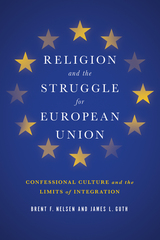
In Religion and the Struggle for European Union, Brent F. Nelsen and James L. Guth delve into the powerful role of religion in shaping European attitudes on politics, political integration, and the national and continental identities of its leaders and citizens.
Nelsen and Guth contend that for centuries Catholicism promoted the universality of the Church and the essential unity of Christendom. Protestantism, by contrast, esteemed particularity and feared Catholic dominance. These differing visions of Europe have influenced the process of postwar integration in profound ways. Nelsen and Guth compare the Catholic view of Europe as a single cultural entity best governed as a unified polity against traditional Protestant estrangement from continental culture and its preference for pragmatic cooperation over the sacrifice of sovereignty. As the authors show, this deep cultural divide, rooted in the struggles of the Reformation, resists the ongoing secularization of the continent. Unless addressed, it threatens decades of hard-won gains in security and prosperity.
Farsighted and rich with data, Religion and the Struggle for European Union offers a pragmatic way forward in the EU's attempts to solve its social, economic, and political crises.

As early as the sixteenth century the liberal democratic state has been forced to confront the question of religion in politics. The result has been a tense and uncomfortable balancing act. Today, in the public square of liberal democracy, a number of religious confessions and beliefs compete for attention. In the American experience, some sense of religious pluralism and relative social harmony has been maintained. However, for this relationship to prevail, a tension must continue to exist—one that balances the political and social pursuits of self-interest with meeting the objectives of the common good.
In Reaping the Whirlwind, John R. Pottenger shows how this process began in the modern world, and how societies attempt to manage this ongoing conflict. The first part of the book lays the groundwork of his analysis by using examples from history to demonstrate the genesis of political and religious "whirlwinds." It goes on to explore contemporary case studies, such as conflicts between Mormons and Evangelicals in the United States, liberation theology in Latin America, Islam and the state in Uzbekistan, and radical Christian reconstructionism.
Pottenger believes that the formal institutions of liberal democracy should maintain this turbulence, even as religious activism threatens to upset the balance. He concludes by advocating religious liberty and recognizing the individual and social need for expression. At the same time, he maintains that the survival of liberal democracy requires that these religious traditions not dominate the public sphere.


Religious activities have been of continuing importance in the rise of protest against postcolonial governments in Eastern Africa. Governments have attempted to “manage“ religious affairs in both Muslim and Christian areas. Religious denominations have acted as advocates of human rights and in opposition to one-party-state regimes. Islamic fundamentalism changed with the ending of the Cold War.
The book is divided into four parts: The Challenge of Islam; Christianity, Sectarianism, and Politics in Uganda; Christians and Muslim in Kenyan Politics; and Cross-cultural Complications. An introductory essay by Michael Twaddle provides and overview of the changing character of politico-religious conflict in Eastern Africa. Holger Bernt Hansen summarizes the presentation with a discussion of dilemmas and challenges in the study of religion and politics.
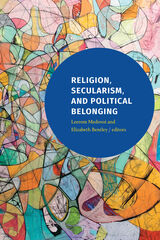
Contributors. Markus Balkenhol, Elizabeth Bentley, Kambiz GhaneaBassiri, David N. Gibbs, Ori Goldberg, Marcia Klotz, Zeynep Kurtulus Korkman, Leerom Medovoi, Eva Midden, Mohanad Mustafa, Mu-chou Poo, Shaul Setter, John Vignaux Smith, Pooyan Tamimi Arab, Ernst van den Hemel, Albert Welter, Francis Ching-Wah Yip, Raef Zreik
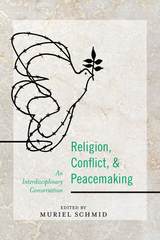
Contributors from varied backgrounds share perspectives and insights gleaned from history, theory, practice, and case studies. While the authors acknowledge the role of religion in generating conflict, they emphasize the part religion can play in conflict resolution. Addressing the centrality of conflict to the human condition, they recognize the consequent difficulty in teasing out the exact role of religion. Overall, the authors assert the necessity of frank, knowledgeable dialogue to understanding sources of, finding grounds for resolving, and managing conflict. Many of the essayists offer creative solutions for building peace. Employing examples and viewpoints drawn from diverse faith traditions, academic traditions, and cultural backgrounds, contributors seek to foster respectful dialogue and debate by exploring the complex dynamic that interconnects religion, violence, and peace.
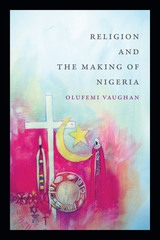
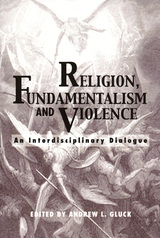
In Religion, Fundamentalism, and Violence, Andrew Gluck brings together distinguished scholars to address a fiercely debated topic: the intersection of religion and violence. Among the contributions is an anthropological analysis of the violence associated with the Abrahamic monotheistic religions of the Middle East, a compelling essay accounting for the violence in Hindu religious traditions, an informative look at the Israeli-Palestinian tensions of more recent times, and an essay on the Catholic just war theory. Each chapter is followed by a commentary and reply, making this volume indispensable for students and scholars of the history of religions.
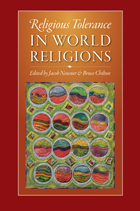
Today, and historically, religions often seem to be intolerant, narrow-minded, and zealous. But the record is not so one-sided. In Religious Tolerance in World Religions, numerous scholars offer perspectives on the "what" and "why" traditions of tolerance in world religions, beginning with the pre-Christian West, Greco-Roman paganism, and ancient Israelite Monotheism and moving into modern religions such as Christianity, Judaism, Islam, Buddhism, and Hinduism. By tolerance the authors mean "the capacity to live with religious difference, and by toleration, the theory that permits a majority religion to accommodate the presence of a minority religion."
The volume is introduced with a summary of a recent survey that sought to identify the capacity of religions to tolerate one another in theory and in practice. Eleven religious communities in seven nations were polled on questions that ranged from equality of religious practitioners to consequences of disobedience. The essays frame the provocative analysis of how a religious system in its political statement produces categories of tolerance that can be explained in that system’s logical context. Past and present beliefs, practices, and definitions of social order are examined in terms of how they support tolerance for other religious groups as a matter of public policy.
Religious Tolerance in World Religions focuses attention on the attitude "that the ’infidel’ or non-believer may be accorded an honorable position within the social order defined by Islam or Christianity or Judaism or Buddhism or Hinduism, and so on." It is a timely reference for colleges and universities and for makers of public policy.
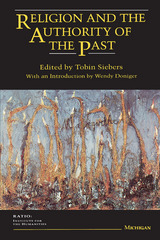
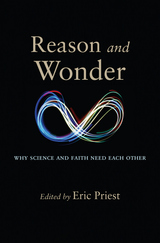
This is exactly what Reason and Wonder does. Eric Priest has brought together twelve of the leading thinkers in science and theology to discuss everything from the origins of the universe to evolution and evil. At the heart of each essay is an understanding that the best science—and the best theology— are both undergirded by an appeal to reason as well as a deep sense of wonder.
Each of these great scientific and theological thinkers offers a chapter on their area of expertise, and the book closes with a stimulating set of questions for group discussion or personal reflection.
- Contributors and their topics include:
- Eric Priest: Towards an integration of science and religion
- Keith Ward: God, science and the New Atheism
- Eleonore Stump: Natural law, reductionism and the Creator
- David Wilkinson: The origin and end of the universe: A challenge for Christianity
- Jennifer Wiseman: Universe of wonder, universe of life
- Kenneth R. Miller: Evolution, faith and science
- Michael J. Murray and Jeff Schloss: Evolution and evil
- Pauline Rudd: Is there more to life than genes?
- David G. Myers: Psychological science meets Christian faith
- John Wyatt: Being a person: Towards an integration of neuroscientific and Christian perspectives
- John Swinton: From projection to connection: Conversations between science, spirituality and health
- Mark Harris: Do the miracles of Jesus contradict science?
- N. T. Wright: Can a scientist trust the New Testament?
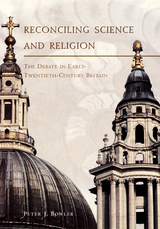
Peter J. Bowler argues that unlike the United States, where a strong fundamentalist opposition to evolutionism developed in the 1920s (most famously expressed in the Scopes "monkey trial" of 1925), in Britain there was a concerted effort to reconcile science and religion. Intellectually conservative scientists championed the reconciliation and were supported by liberal theologians in the Free Churches and the Church of England, especially the Anglican "Modernists." Popular writers such as Julian Huxley and George Bernard Shaw sought to create a non-Christian religion similar in some respects to the Modernist position. Younger scientists and secularists—including Rationalists such as H. G. Wells and the Marxists—tended to oppose these efforts, as did conservative Christians, who saw the liberal position as a betrayal of the true spirit of their religion. With the increased social tensions of the 1930s, as the churches moved toward a neo-orthodoxy unfriendly to natural theology and biologists adopted the "Modern Synthesis" of genetics and evolutionary theory, the proposed reconciliation fell apart.
Because the tensions between science and religion—and efforts at reconciling the two—are still very much with us today, Bowler's book will be important for everyone interested in these issues.
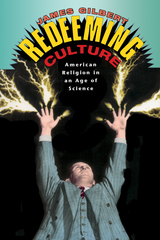
"Anyone seriously interested in the history of current controversies involving religion and science will find Gilbert's book invaluable."—Peter J. Causton, Boston Book Review
"Redeeming Culture provides some fascinating background for understanding the interactions of science and religion in the United States. . . . Intriguing pictures of some of the highlights in this cultural exchange."—George Marsden, Nature
"A solid and entertaining account of the obstacles to mutual understanding that science and religion are now warily overcoming."—Catholic News Service
"[An] always fascinating look at the conversation between religion and science in America."—Publishers Weekly
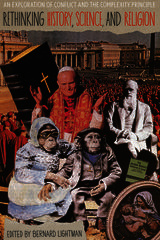
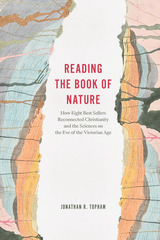
When Charles Darwin returned to Britain from the Beagle voyage in 1836, the most talked-about scientific books of the day were the Bridgewater Treatises. This series of eight works was funded by a bequest of the last Earl of Bridgewater and written by leading men of science appointed by the president of the Royal Society to explore "the Power, Wisdom, and Goodness of God, as manifested in the Creation." Securing public attention beyond all expectations, the series offered Darwin’s generation a range of approaches to one of the great questions of the age: how to incorporate the newly emerging disciplinary sciences into Britain’s overwhelmingly Christian culture.
Drawing on a wealth of archival and published sources, including many unexplored by historians, Jonathan R. Topham examines how and to what extent the series contributed to a sense of congruence between Christianity and the sciences in the generation before the fabled Victorian conflict between science and religion. Building on the distinctive insights of book history and paying close attention to the production, circulation, and use of the books, Topham offers new perspectives on early Victorian science and the subject of science and religion as a whole.
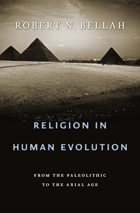
A New York Times Book Review Editors’ Choice
An ABC Australia Best Book on Religion and Ethics of the Year
Distinguished Book Award, Sociology of Religion Section of the American Sociological Association
Religion in Human Evolution is a work of extraordinary ambition—a wide-ranging, nuanced probing of our biological past to discover the kinds of lives that human beings have most often imagined were worth living. It offers what is frequently seen as a forbidden theory of the origin of religion that goes deep into evolution, especially but not exclusively cultural evolution.
“Of Bellah’s brilliance there can be no doubt. The sheer amount this man knows about religion is otherworldly…Bellah stands in the tradition of such stalwarts of the sociological imagination as Emile Durkheim and Max Weber. Only one word is appropriate to characterize this book’s subject as well as its substance, and that is ‘magisterial.’”
—Alan Wolfe, New York Times Book Review
“Religion in Human Evolution is a magnum opus founded on careful research and immersed in the ‘reflective judgment’ of one of our best thinkers and writers.”
—Richard L. Wood, Commonweal
READERS
Browse our collection.
PUBLISHERS
See BiblioVault's publisher services.
STUDENT SERVICES
Files for college accessibility offices.
UChicago Accessibility Resources
home | accessibility | search | about | contact us
BiblioVault ® 2001 - 2024
The University of Chicago Press









